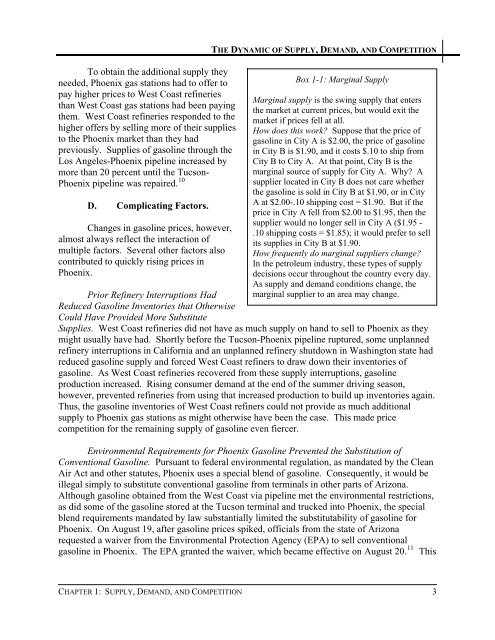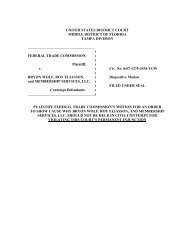Gasoline Price Changes - Federal Trade Commission
Gasoline Price Changes - Federal Trade Commission
Gasoline Price Changes - Federal Trade Commission
You also want an ePaper? Increase the reach of your titles
YUMPU automatically turns print PDFs into web optimized ePapers that Google loves.
To obtain the additional supply they<br />
needed, Phoenix gas stations had to offer to<br />
pay higher prices to West Coast refineries<br />
than West Coast gas stations had been paying<br />
them. West Coast refineries responded to the<br />
higher offers by selling more of their supplies<br />
to the Phoenix market than they had<br />
previously. Supplies of gasoline through the<br />
Los Angeles-Phoenix pipeline increased by<br />
more than 20 percent until the Tucson-<br />
Phoenix pipeline was repaired. 10<br />
D. Complicating Factors.<br />
<strong>Changes</strong> in gasoline prices, however,<br />
almost always reflect the interaction of<br />
multiple factors. Several other factors also<br />
contributed to quickly rising prices in<br />
Phoenix.<br />
THE DYNAMIC OF SUPPLY, DEMAND, AND COMPETITION<br />
Box 1-1: Marginal Supply<br />
Marginal supply is the swing supply that enters<br />
the market at current prices, but would exit the<br />
market if prices fell at all.<br />
How does this work? Suppose that the price of<br />
gasoline in City A is $2.00, the price of gasoline<br />
in City B is $1.90, and it costs $.10 to ship from<br />
City B to City A. At that point, City B is the<br />
marginal source of supply for City A. Why? A<br />
supplier located in City B does not care whether<br />
the gasoline is sold in City B at $1.90, or in City<br />
A at $2.00-.10 shipping cost = $1.90. But if the<br />
price in City A fell from $2.00 to $1.95, then the<br />
supplier would no longer sell in City A ($1.95 -<br />
.10 shipping costs = $1.85); it would prefer to sell<br />
its supplies in City B at $1.90.<br />
How frequently do marginal suppliers change?<br />
In the petroleum industry, these types of supply<br />
decisions occur throughout the country every day.<br />
As supply and demand conditions change, the<br />
marginal supplier to an area may change.<br />
Prior Refinery Interruptions Had<br />
Reduced <strong>Gasoline</strong> Inventories that Otherwise<br />
Could Have Provided More Substitute<br />
Supplies. West Coast refineries did not have as much supply on hand to sell to Phoenix as they<br />
might usually have had. Shortly before the Tucson-Phoenix pipeline ruptured, some unplanned<br />
refinery interruptions in California and an unplanned refinery shutdown in Washington state had<br />
reduced gasoline supply and forced West Coast refiners to draw down their inventories of<br />
gasoline. As West Coast refineries recovered from these supply interruptions, gasoline<br />
production increased. Rising consumer demand at the end of the summer driving season,<br />
however, prevented refineries from using that increased production to build up inventories again.<br />
Thus, the gasoline inventories of West Coast refiners could not provide as much additional<br />
supply to Phoenix gas stations as might otherwise have been the case. This made price<br />
competition for the remaining supply of gasoline even fiercer.<br />
Environmental Requirements for Phoenix <strong>Gasoline</strong> Prevented the Substitution of<br />
Conventional <strong>Gasoline</strong>. Pursuant to federal environmental regulation, as mandated by the Clean<br />
Air Act and other statutes, Phoenix uses a special blend of gasoline. Consequently, it would be<br />
illegal simply to substitute conventional gasoline from terminals in other parts of Arizona.<br />
Although gasoline obtained from the West Coast via pipeline met the environmental restrictions,<br />
as did some of the gasoline stored at the Tucson terminal and trucked into Phoenix, the special<br />
blend requirements mandated by law substantially limited the substitutability of gasoline for<br />
Phoenix. On August 19, after gasoline prices spiked, officials from the state of Arizona<br />
requested a waiver from the Environmental Protection Agency (EPA) to sell conventional<br />
gasoline in Phoenix. The EPA granted the waiver, which became effective on August 20. 11 This<br />
CHAPTER 1: SUPPLY, DEMAND, AND COMPETITION 3
















